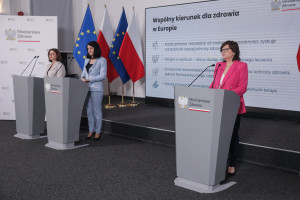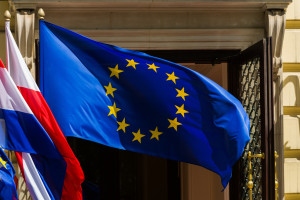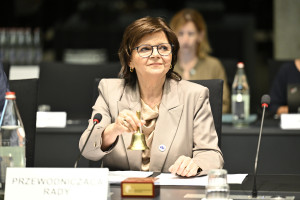"Miodowa 15": What convinced the Germans to change their minds? Katarzyna Kacperczyk on the backstage of the Polish presidency

- Poland concluded its presidency of the EU Council (January 1–June 30, 2025) by passing the baton to Denmark. One of the most difficult tasks was finding a compromise on the document changing the rules for pharmaceutical companies.
- How did we do it? Deputy Minister of Health Katarzyna Kacperczyk shares the details on the program "Miodowa 15"
- He says of the negotiations: " From the outset, we adopted a very consistent negotiation strategy, but also one that focused on the negotiations. In previous talks, conducted under other presidencies, attempts were made to convince companies to continue investing in the market. Everything revolved around them. And of course, that's important, but then we lost sight of the purpose of these solutions."
- On relations with Denmark, which is taking over the presidency: "We were threatened before the negotiations began that Denmark wouldn't support us. But we succeeded. Not only that, but we also started negotiations with the European Parliament during our presidency."
- On Big Tech and mental health: "The commission will be looking at the impact of cyberspace and virtual space regulations on children's mental health. It will also impose certain obligations on companies regarding online safety. I don't know if Elon Musk will analyze this, but I hope so, because it's important."
- Klara Klinger talks to Katarzyna Kacperczyk
Klara Klinger, Health Market: How many European Union ministers do you have the mobile numbers of in your phone?
Katarzyna Kacperczyk, Deputy Minister of Health: I think it was for everyone. And not just ministers, but also European Commission officials and MEPs. Maintaining contact was important.
Were negotiations conducted via text messages?
Not really via text messages, but there were phone calls and meetings arranged.
I'll quote your words from the European Economic Congress in May 2024, before the start of your presidency. When asked what our greatest success would be, you said: proving we can negotiate. Did you believe that at the time?
I spoke about the pharmaceutical package back then. And I can say that I always believed in it, although of course I wasn't entirely convinced it would succeed, because it's the biggest reform of pharmaceutical law in 20 years.
You already added behind the scenes that you need to have a plan B and a plan C.
Negotiations on this matter began during the Swedish presidency, then the Spanish and Belgian presidencies took over, followed by the Hungarian presidency, and finally the Polish one. So this was the fifth round. It's no wonder no one believed it would succeed; it seemed that each presidency would inherit the pharmaceutical package.
Let's recall what the dispute was about. The dispute involved billions of euros.
From a strategic perspective, this document is difficult because it truly encompasses the strategic interests of member states, which were not unified. And not only governments but also industry. The package establishes rules for market entry. On the one hand, it concerns large pharmaceutical companies that introduce original, expensive drugs to European Union markets, but at the same time, the generic industry is also developing in many countries, introducing substitutes and cheaper drugs. What was crucial for us during the negotiations was the interest of patients.
But I understand that what was really at stake here was how long a drug under patent protection would be available. That is, money.
This was the element that appeared most frequently in the media: data exclusivity and market protection. While this protection lasts, generic companies cannot introduce an equivalent, yet cheaper, drug into the market. But there were many more difficult and important elements that were part of the final compromise. For example, the issue of patient access to innovative drugs. In many countries, these drugs are introduced with delays. And this was also addressed as part of the compromise. Will a company refuse? A generic will automatically be able to enter the market.
How?
Thanks to the new regulations, a member state will be able to require a company to introduce a given drug to the market. Failure to do so will result in a shortened period of protection in that country. In other words, in a given market where there is no new drug, a generic company will automatically be able to introduce a substitute faster to protect patients.
Who was the hardest to convince?During the negotiations, the countries were divided according to who has companies producing original drugs in a given market and those with a generic business.
Yes, the first group included: France, Germany, Italy, the Scandinavian countries, i.e. Denmark, Sweden, Finland, as well as Greece and Belgium.
That is, a minority.
But blocking, because they represent a larger number of residents.
So who did you call? You probably needed to find an ambassador of compromise within this blocking minority.
From the outset, we adopted a very consistent negotiation strategy, but also one that focused on the negotiations themselves. In previous negotiations, conducted under other presidencies, attempts were made to convince companies to continue investing in the market. Everything revolved around them. And of course, this is important, but then we lost sight of the purpose of these solutions. For us, the most important argument was the patient, and we stuck to that.
Are you trying to convince me that the health ministers of Germany or France said: "Oh, we really forgot that the patient is the most important thing here" and stopped thinking about the profits or losses for the state budget?
Yes, because patients are key and most important to every health minister. Look at it this way: the longer cheaper drugs can't enter the market, the greater the burden on the payer. For example, Germany, like Poland, has a relatively generous reimbursement system. And if we only have expensive drugs on the market, no country will be able to afford such a reimbursement system. Countries also weigh these interests between the burden on the budget and the availability of drugs. But that doesn't mean these interests can't be reconciled, because nothing stands in the way of reaching such a compromise—as we succeeded—and actually guaranteeing profits while also maintaining interest in introducing expensive, innovative drugs. And ensuring faster patient availability.
Returning to the question: which of these countries has truly become our ally? The minister smiles.
It's a sweet diplomatic secret, but I think it was a huge success that this package was actually supported unanimously by all member states. It wasn't obvious at all, because not everyone was an ally from the start, meaning not everyone supported this compromise. It was truly the result of negotiations.
Let me ask it differently: who was the hardest to convince?
There were two stages. First, an expert phase, during which teams analyzed 1,500 pages of documents to prepare a text ready for negotiation. After completing this technical phase, we identified several areas where agreement was impossible within the working group in Brussels. These were then taken over by the health ministers themselves. And that doesn't happen often. I know what I'm talking about because I have many years of experience, dating back to the Ministry of Foreign Affairs. This only happens when it comes to an important, strategic document, and the differences are truly significant. The pharmaceutical package is an example of this: the final compromise, consisting of the few elements that couldn't be agreed upon at the expert level, was negotiated directly by the ministers. Hence the phone numbers, because we had to establish contacts and arrange quick meetings. And we had a lot of them, primarily with representatives of the blocking minority. I can only reveal that we had very good, constructive cooperation with Denmark, which is taking over the presidency from us. Although many people believed that Denmark would be the country where there would be no room for discussion, but...
Recall that Denmark has the largest manufacturer of original pharmaceuticals. It seemed that it would not support solutions shortening the data protection period.
That's why we were threatened before the negotiations began that Denmark wouldn't support us. But we succeeded. Not only that, but we also began negotiations with the European Parliament during our presidency. And in the spirit of this good cooperation, Danish representatives also participated with us in this first trilogue, in the first negotiation meeting with the European Parliament. We're keeping our fingers crossed for Denmark, and I think they'll quickly establish a framework for the final text with the Parliament. And here's something else I'd like to add.
?
The editor asked if I believed in success, so let me clarify: I certainly didn't assume that the potential compromise would be adopted unanimously. Our goal was a majority. And here's a pleasant surprise. This shows that EU member states have embraced this responsibility for patients and for drug safety. This is especially true given that the geopolitical situation wasn't conducive to negotiations: Donald Trump's election victory and the threat of tariffs, for example, heightened fears that pharmaceutical companies might withdraw from the European market. I believe the compromise we managed to reach will prevent this, and at the same time, the elements introduced will allow for faster introduction of cheaper drugs to the market.
Everyone in Poland appreciates the outcome of the negotiations. But they keep pointing out that we're still dependent on Asia, on China. So the problem is much bigger, much broader, and will affect all of Europe.
Drug safety was one of our priorities. As early as 2024, we urged the Commission to submit legislative proposals during the Polish Presidency that would strengthen the potential for the production of medicines and active ingredients in Europe. Indeed, in March of this year, the Commissioner for Health presented a draft of the so-called Critical Medicines Act, which provides mechanisms to support the development of production in European Union member states, including Poland. This concerns medicines that will underpin our countries' health security in the event of unforeseen events.
Companies welcome this support, but fundamentally believe it's unrealistic to stop producing in Asia. The costs would be so enormous that the drugs would have no chance of being reimbursed.
It should not be expected that the production of all substances and medicines will move to Poland or another European Union country overnight, but it should also be taken into account that there are countries that produce them to a large extent at home, e.g. API - Greece, but also Italy, which means that it is not impossible.
"EU mills grind slowly"We're talking about medication safety. But work was also underway on psychological safety. A joint document was created at the end of our presidency, but reading it, I had the impression it consisted of nothing but slogans: "awareness must be raised, education must be provided, etc."
Yes, this is obvious to everyone, but those who understand how the EU's regulatory framework operates realize that it's not like we'll just throw a topic on the agenda and immediately have concrete solutions. Looking at other sectoral policies, we can closely trace how regulations are developed over the years. It often started with a single sentence, for example, in the European Council conclusions. This was the case with climate policy. From there, it snowballs. Regarding the priority of children and young people's mental health safety in the context of social media, this topic has not been on the EU agenda so far. And if we want to introduce specific legal acts, the Commission must draw its mandate from somewhere. Because it's not like a Commissioner or the Director General of the Directorate General for Health will wake up in the morning and say: "We'll present some regulations today." They must receive a mandate from the member states to act and address the issue.
It's strange that something like this hasn't happened before.
Mental health was mentioned in very general terms, so no one would have addressed it. Meanwhile, in discussions we held even before the presidency began, every member state highlighted the enormous problem with the impact of social media on the mental health of children and young people. We managed to introduce this topic not only to the agenda of the Commissioner for Health, but also to the agenda and priorities of the President of the European Commission, i.e., the entire European Commission. I agree that these conclusions contain many phrases that seem obvious to us. But these conclusions are always structured this way: there's a section that outlines the problem in general, and then there are recommendations for member states and the European Commission. And that provides a mandate for action.
What specifically could be done? Big tech wields enormous power in this area. It's not just in medicines that they have a monopoly.
The Commissioner's announcement indicates that the European Commission has already begun work. It will prepare a thorough and comprehensive study of all European Union member states to diagnose the problem. A report will be prepared, based on which standards and recommendations will be developed, specifying in which areas and how this issue should be addressed. It must also be said that new digital technologies are not all evil, right? We also live with them, use them, they improve our lives, and are a prerequisite for civilizational progress, so we cannot throw the baby out with the bathwater.
The conclusions also include specific recommendations regarding what will be required of companies that own online platforms. What we have introduced into the conclusions, and which is very important, is the requirement that the Commission be obligated to evaluate the effectiveness of these instruments in terms of mental health and their impact on the mental health of children and young people. This evaluation will conclude with recommendations for companies.
So Elon Musk, when introducing his solutions, would also have to analyze how it affects the mental health of children and adolescents?
I don't know if Elon Musk will analyze this, but I hope so, because it's important. The commission will examine the impact of cyberspace regulations and virtual spaces on children's mental health. It will also impose certain obligations on companies regarding online safety.
Copyrighted material - reprint rules are specified in the regulations .
rynekzdrowia







